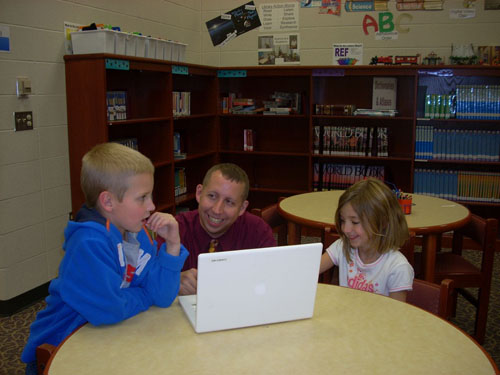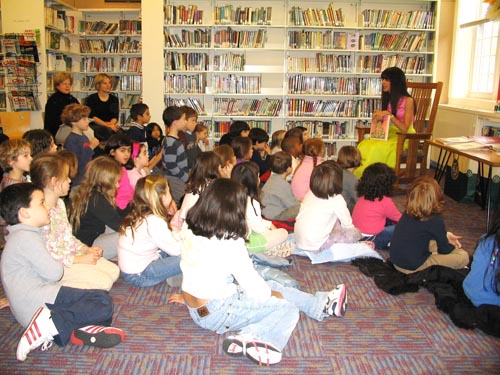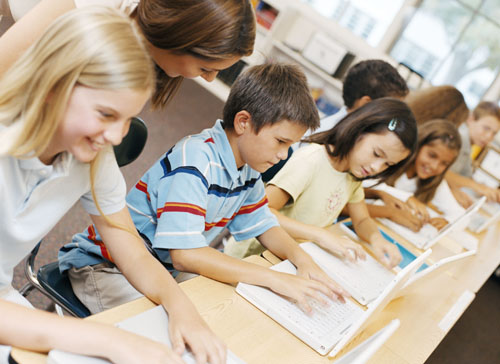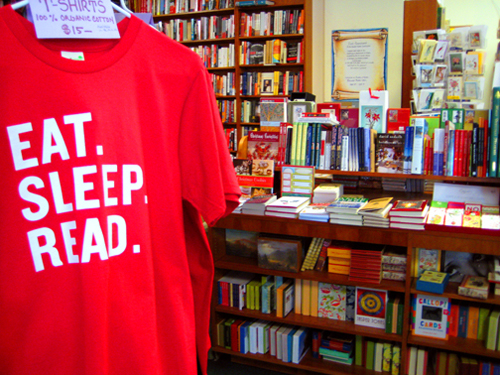
Como o papel da biblioteca escolar eo bibliotecário escolar deve evoluir na escola do século 21?
Nosso tempo é uma era da informação. Há muitos desafios que enfrentamos relacionados com informações, tais como a precisão, propriedade, acessibilidade e privacidade. Estilos de vida são mais agitado do que nunca, o que significa que nós sentimos a necessidade de processar informações mais rapidamente. Parece mais frequentemente do que nunca ouvimos preocupações sobre a falta de literacia mediática. Whom or what can we trust? Both formal and informal sources of information have been challenged. What does this mean for our children? Naturally that depends on the kind of society we want to create. No entanto, I think we would all agree that it is essential we help our children navigate and interpret the vast complex pool of material they are exposed to so as to make informed judgments both as users of information and as future creators of information. Has there ever been a time in our history more crucial for kids to have the right kind of support?
I had the pleasure to chat with Carl Harvey, President of the American Association of School Librarians about the SKILLS Act (Strengthening Kids’ Interesse em aprender e Bibliotecas) entre outras coisas relacionadas com o impacto das bibliotecas escolares do século 21 sobre o processo educacional, bem como a faculdade e preparação carreira.
Carl, quais são os problemas enfrentados por bibliotecas escolares do século 21?
Eu acho que os maiores problemas enfrentados bibliotecas escolares são os mesmos problemas enfrentados pela educação como um todo: budgets and funding. I think schools are grappling with those issues on every level. We are trying to get the funding that we need for collections, pessoal e outros recursos.
I think there is also a perception that if we don’t have the paper books then we don’t need the library or the librarians in schools. I think it’s flawed logic. Information is changing its format; sim, it’s online, it’s an ebook, it’s a book you can download onto an iPad, but it’s still information. Kids need to know how to evaluate it even more so now than before because there is much more of it. Kids need to be able to determine whether it is useful or valid information. Librarians take the lead in helping educate students through the information jungle, and with even more sources and formats, the role of the librarian becomes even more critical. So even though paper books are becoming less prominent, the skills needed are even more advanced than what was needed before. School librarians are critical to helping students navigate through this information explosion.
What are the important changes 21st century school libraries need to make to continue to attract their student audience?
I think school libraries are looking at ways that kids can work in small groups. Libraries are not a quiet place anymore. There are lots of activities and classes going on, including instruction, checking out materials, bringing in special speakers, bringing in the community, letting the kids perform, and setting up a café or a special place like that. Libraries are always looking at services they can provide to their patrons. I think the other thing that is the big draw is that when you come to that library you also have that librarian. You have someone you can quickly go to for help in terms of facilitating your project. If a kid is off somewhere by himself, he may not have that support or service. And so I think all those things combined create a place where kids want to go.

What will 21st century school libraries do as digital books become more and more accessible?
I think we will do what we’ve always done each time we got a new format, such as audio books and video tapes. We figure out what is the best way to provide those types of resources for our patrons. What is more difficult with ebooks is the vast amount of different readers that are out there. It is therefore a more complicated issue to figure out. Right now you are seeing different pockets of people trying different things to try and figure out what might be the best plan, and I don’t know that the best plan exists yet. We have a product here called myOn Reader which uses ebooks from a library publisher. We also have Playaways. We also have ebooks from other publishers’ catalogs, so there are many different things which we are exploring, trying to see what might be the best system. At this point it’s all still new and people are trying to figure out what the best model is going to be. We have students with many different devices (or no devices), so how do we make sure the resources we’re purchasing can work on a multitude of platforms and devices? How do we provide access for students who don’t have devices? Lots of issues to consider.
So if I asked what is the timetable to opening library doors to a digital library what might your response be?
There are school libraries that are already doing that but there is not a consistent way across the country that this is being done. We’re asking ourselves: what are my patrons asking for? That’s what we need to figure out. It’s in process. Ebooks is a very hot topic in our field at this point.
Why is the Skills Act so important?
(Nota: The Skills Act was conceived to help improve student achievement by ensuring more students have access to effective school library programs that will allow them to compete in today’s information age. The Skills Act would provide more funding to enhance library programs such as digital literacy instruction for librarians, increased staffing levels in school libraries, better co-ordination between librarians and teachers, and reducing the “access gap” between schools in wealthy communities versus those where there are high levels of poverty.)
When “Nenhuma criança Deixada atrás” was passed, school libraries were not mentioned at all in the legislation. Our hope with the Skills Act is to put school libraries in and be recognized as a vital part of the school ecosystem and as important educators in the school system. The Skills Act asks that government support school library programs so that they support all students. We are trying to paint the picture of what a 21st century school library should look like — a digital collection with digital resources as well as print. We’re trying to get some funding for school libraries targeted from the Federal level. Para mais informações: http://www.ala.org/aasl/congressionalbriefing
Any final thoughts on 21st century school libraries: why are they such an important part of our culture and why must we continue to support them?
I think all libraries in general provide their patrons access to information whether online or print. That access is a core value. School librarians are also teachers. And so their role is to help students figure out how they get through all of the information that is out there. How do I figure out if this is valid? How do I figure out if this is relevant? As information continues to explode, there is a limit as to how much content school is going to be able to cover in K through 12. Portanto, temos para oferecer aos nossos filhos com processos e sistemas para lidar com todas as informações que eles estão indo para ir além do conteúdo que eles ficam na escola, so that when they leave us, they can find the information they need for their job and figure out how to use it effectively. I think that the school library’s place is to help with that process.

Fotos gentilmente cedidas por Carl Harvey e Henmead Empresas, Inc.
Como vamos Leia? Página da comunidade
Para mais Como vamos ler? artigos: clique aqui
C. M. Rubin é o autor de duas séries on-line lido pelo qual ela recebeu uma 2011 Upton Sinclair prêmio, "The Search Global pela Educação" e "Como vamos ler?"Ela também é o autor de três livros mais vendidos, Incluindo The Real Alice no País das Maravilhas.





Comentários Recentes